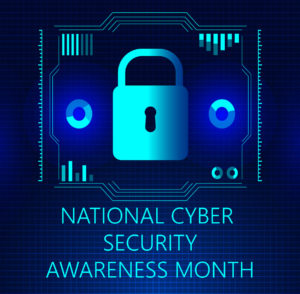
“If you put a key under the mat for the cops, a burglar can find it, too. Criminals are using every technology tool at their disposal to hack into people’s accounts. If they know there’s a key hidden somewhere, they won’t stop until they find it.”
~ Tim Cook, CEO of Apple
October is National Cyber Security Awareness Month. In preparation, our team hit the pause button to reflect on our daily interactions with the internet, share our experiences with fraud, and discuss best practices with regard to cyber security. Below are some key takeaways and suggestions to help you keep your private information and investment accounts secure.
Beware of E-mail
If there is one piece of advice you take from this article, let it be this: Do not share personal information over e-mail. Be mindful of private details disclosed in your electronic communications and suspicious of e-mails you receive. You should never, ever, disclose sensitive data, such as account numbers, social security numbers, and passwords, over e-mail. Instead, make it a habit to provide such details in person, over the phone, or through previously vetted, secure portals.
Did you know? ML&R Wealth Management has a client portal, which can be used to share private information and confidential documents securely with us. Ask your advisor to learn more about our portal.
When it comes to your inbox, some red flags to be on the lookout for include unsolicited requests for money, invitations to click on links or attachments, monetary transactions involving foreign countries, and language that indicates that funding is urgent. Our advisors and associates have been trained to distinguish suspicious e-mail communications and have successfully prevented numerous fraudulent transactions. If you suspect fraud, contact us so we can help you identify the next steps.
Protect your Passwords
We’ve all been warned time and again: create strong passwords and change them frequently and do not use the same password across different websites. Weak passwords make it easy for hackers to gain access to your accounts. If you are having trouble generating secure passwords (and remembering them), you should consider using a digital password manager.
Did you know? Digital password managers, such as LastPass and Dashlane, can help you securely create, save, and autofill passwords.
“Don’t write down your passwords and leave them next to your computer,” says ML&R Wealth Management Associate Sarah Kircher. “Instead, use a secure password storage system to store your passwords and other account information.” If you must share passwords, the safest way to do so is in person or verbally. Do not disclose your passwords over e-mail, and try to avoid logging into your accounts from public networks. “Avoid financial transactions like online banking and e-commerce when you are connected to a public Wi-Fi network that has no password requirement,” recommends Kira Scott, also an Associate at ML&R Wealth Management. “These networks are typically not encrypted, and your information can be easily picked up.”
Set up Dual Authentication
Several websites, including e-mail providers and banking platforms, have adopted dual authentication mechanisms to help secure their client’s accounts. Dual authentication uses your password in addition to an alternative electronic verification method, such as fingerprints, facial recognition, PINs, and physical tokens. We encourage you to take advantage of dual authentication any time it is available to you, particularly for banking websites and investment accounts.
Did you know? Both Schwab and Fidelity offer two-step authentication, making it more difficult for someone to access your accounts.
Monitor Your Accounts
Review your financial statements frequently to monitor for fraudulent activity. Banks and financial institutions have settings that allow you to receive alerts for unusual behaviors, such as withdrawals that exceed certain amounts or account logins from new devices. In addition, Scott Adair, Advisor at ML&R Wealth Management, recommends “taking advantage of the free annual credit reports available, to ensure that there is no unusual activity, like someone trying to open accounts in your name”.
Did you know? You are entitled by Federal Law to free annual credit reports from the three major credit bureaus. These can be requested online or by phone.
Communicate with your Advisor
Lastly, an open line of communication with your financial advisor is key to protecting you from fraudsters. Please keep us informed of changes to your personal information, such as e-mail, address, and telephone number, so that we can update your accounts accordingly. When you request monetary transactions, give us as much context as possible, including contact information for the party that is requesting funds.
Did you know? When appropriate, we will reach out to the receiving party on your behalf to verbally confirm the details of your transactions.
Our advisors and associates at ML&R Wealth Management are devoted to keeping your information secure during national cyber security awareness month and every month! Never hesitate to reach out to us if you would like to discuss best practices to protect your accounts. You can also reference our Cybersecurity Infographic, available here.



